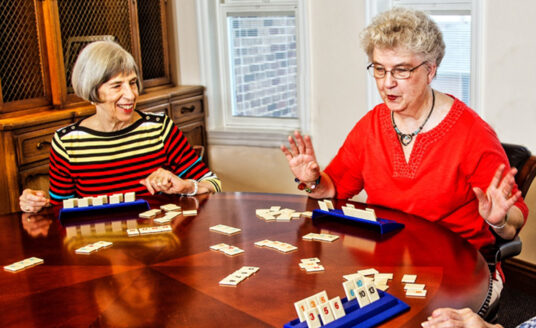Even though the housing market is beginning to cool, it is still an ideal time to sell a home and, if you are so inclined, move into a senior living community. But there are questions to consider prior to making the move.
Where Are You Going?
First, seniors and their family members (who often help with the decision) should consider communities that meet the current and future needs of the senior. As many of these communities have waiting lists, the search should begin early. Also, it helps to not be in a situation where an illness or injury accelerates the selection process.
Most independent and assisted living apartments are smaller than the senior’s current home. Therefore, a good understanding of the apartment’s size and floor plan will be key to determining what items can be taken to the community and what needs to be disposed of.
How Can You Downsize?
The sheer size and quantity of items that many of us amass over a lifetime can be overwhelming. There are items you need for daily living, like pots and pans, and items that provide comfort, like a favorite chair. There are items that make the home feel like home, like photos and knick-knacks, and items that are cherished for the memories they evoke, like a favorite set of China traditionally used during holiday gatherings.
Downsizing strategies can include the following:
Start early. Experts say to begin downsize planning three months in advance of a move. Prioritizing and packing takes a lot of time.
The “one-year” rule. If you haven’t used or enjoyed an item in the past year, give strong consideration to gifting it to someone else or otherwise disposing of it.
Make a gift list. While sorting, make a written list of who is going to take possession of items that will be left behind.
Keep some things of sentimental value. We all have items in our homes that bring back fond memories. Hang on to those and eliminate what you can do without.
Sort items by keep, toss, or give away. These are probably going to be tough decisions, and can result in leaving many things as “maybes.” This just puts off a decision that will have to be made, and adds to the stress of downsizing. Making the decision at the time of the sorting may be hard, but will benefit in the long run.
Senior and family members might also consider an estate sale, to make some money while paring down possessions.
Begin in unused rooms. These spaces are more likely to hold items that have gone unused and have been forgotten— and therefore prime areas for things that can be eliminated.
Go room by room. A systematic approach is more efficient than wandering back and forth between rooms. It also creates an incentive to stay methodically focused on the process as you complete tasks.
Prioritize a problem area. If you have a garage, attic, basement, shed or closet that is filled with items, take on this tough job first. Consider what won’t be required in the senior community, like a lawnmower, hedge trimmers, paint, window air conditioners — and the toboggan that’s been stored in the garage rafters for 30 years!
Don’t forget to label. Moving boxes around is hard work. Make sure they are labeled so they can be carried to the appropriate room.
Pack essentials. There are items the senior will need on day one at the community or that need to be safely secured while moving. The list would include:
- Clothes
- Toiletries, medications, and eyeglasses
- Important documents
- Basic kitchen and food supplies
- Cleaning supplies
Make it a priority to know where these are packed at all times for quick retrieval.
Get help if needed. Ask friends and family for help or consider assistance from professional moving companies. These services can include assistance with space planning in the community unit, helping with downsizing, packing, moving, and storage services. As there may be waiting lists for these companies, contact them early on.
How Will You Sell Your Home?
Just like with downsizing, there is a process for selling a home, and the services provided by a real estate agent are worthwhile for most people.
Learn the value of the home. A real estate agent can supply the approximate value of the home by the value of comparable homes nearby.
Perform necessary upgrades and repairs. The agent may suggest upgrades and repairs that will increase the home’s selling price. Sellers may need to work on outside areas as well as keeping the home prepared for visitors who want to view the property and home. Agents can advise as to what potential buyers are looking for and what may distract, like clutter. Buyers want to imagine what their belongings would look like in the home, not what the homeowner’s possessions currently look like in the home.
Market. Agents can provide marketing help in terms of photos, posted online, and scheduling visits by potential buyers. Buyers often feel uncomfortable touring a house when the owners are present and may not freely express their opinions. An agent showing the home can share comments and concerns that visitors may have with the owners.
At Bethesda, these services are provided in a program called “Moving with Ease.” Feel free to click here to access our Independent Living communities and learn more.
What Should You Expect from a Senior Living Community?
If a senior chooses senior living communities like those at Bethesda, he or she can expect a welcoming atmosphere from staff and residents, a vibrant environment with many social activities, celebrations, exercise classes, dining options, and attractive surroundings. As the senior’s needs change, communities like Bethesda have the capacity to increase care, providing independent living, assisted living, skilled nursing, and memory support.
Choosing the best senior living community, following a downsizing plan, and selling your home are all challenging activities. In the end, it is advisable not to dwell on what you have left behind, but rather look forward to enjoying all the new options that living in a senior community will provide.
When you’re ready to move, contact Bethesda to find your perfect senior living community.
| Whether in independent living, assisted living, memory care, or skilled nursing, Bethesda offers the right amenities, services, programming, and staff to make every day full of purpose. See for yourself and tour our independent living communities, including Bethesda Barclay House – Clayton, Bethesda Gardens – Kirkwood, Bethesda Orchard – Webster Groves, Bethesda Terrace – South County, Village North Retirement Community – Florissant, and The Oaks at Bethesda Villas – Kirkwood/Webster. |



